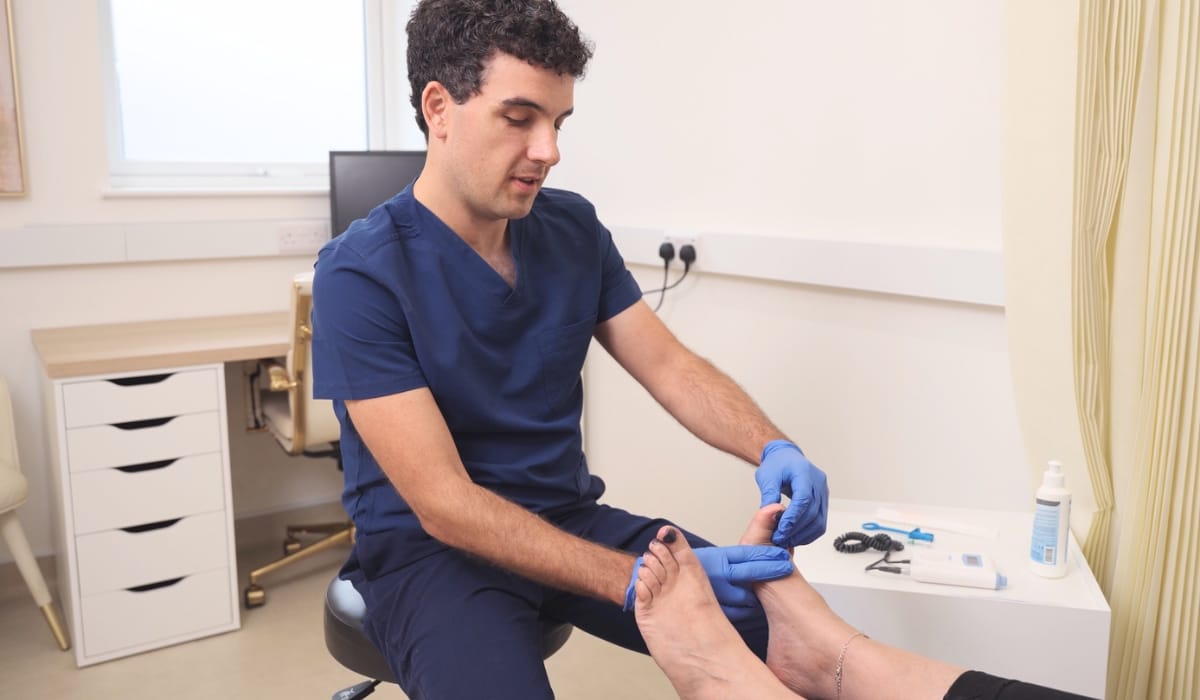Treatment options and pricing
Browse and click below to book any of our available services.
Please note: The initial podiatry consultation includes other verruca treatments if appropriate; however, cryotherapy will incur an additional charge (Cryotherapy add-on £40 – PODIATRY (up to 5)).
General Podiatry Consultation Initial Appointment
Included in the General Podiatry Consultation Initial Appointment
In a General Podiatry Consultation, you will meet with a podiatrist who will assess your foot and lower limb health, diagnose any conditions or issues, and provide expert guidance and treatment recommendations tailored to your unique needs.
Please note: The initial podiatry consultation includes other verruca treatments if appropriate; however, cryotherapy will incur an additional charge (Cryotherapy add-on £40 – PODIATRY (up to 5)).
General Podiatry Consultation Follow-up Appointment
Included in the General Podiatry Consultation Follow-up Appointment
During a follow-up appointment, the podiatrist will review your progress, discuss the effectiveness of previous treatments, address any new concerns, and may provide further guidance or adjustments to the treatment plan for ongoing foot health and comfort.
Cryotherapy Initial Consultation & Treatment up to 3 Lesions
Included in the Cryotherapy Initial Consultation & Treatment up to 3 Lesions
During your initial cryotherapy consultation and treatment, we’ll examine the affected area, explain the procedure, address any concerns you may have, and then proceed with the cryotherapy treatment to effectively remove the skin tag, ensuring your comfort and convenience.
Cryotherapy Initial Consultation & Treatment of Large Lesion or up to 6 Lesions
Included in the Cryotherapy Initial Consultation & Treatment of Large Lesion or up to 6 Lesions
During your initial cryotherapy consultation and treatment, we’ll examine the affected area, explain the procedure, address any concerns you may have, and then proceed with the cryotherapy treatment to effectively remove the skin tag, ensuring your comfort and convenience.
Common Q&A about Verruca Treatment
Our FAQ section is designed to address common questions you may have, from how our treatments work to what you can expect during and after your session.
Our team is always available to provide additional support if you need more personalised guidance, ensuring that you feel informed and confident every step of the way.
A verruca, commonly known as a wart, is a benign growth caused by the human papillomavirus (HPV) that typically appears on the feet.
Treatment options include cryotherapy (freezing), topical medications (salicylic acid) and surgical removal.
Yes, verrucas can spread through direct contact or by sharing surfaces like showers or swimming pools.
Treatment duration varies; cryotherapy may require multiple sessions, while topical treatments can take several weeks to show results.
Over-the-counter treatments like salicylic acid are available for at-home use, but consult a healthcare professional for persistent cases.
Possible side effects include pain, skin irritation, and discoloration at the treatment site.
Treatment isn't always necessary, especially if the verruca is painless and doesn't interfere with daily activities, but it can help prevent spreading.
Yes, verrucas can recur, as the HPV virus can remain dormant in the skin.
Avoid picking at the verruca, sharing personal items, and walking barefoot in communal areas to reduce the risk of spreading.
Consult a doctor if the verruca is painful, changes in appearance persists after home treatment, or if you have a weakened immune system.




